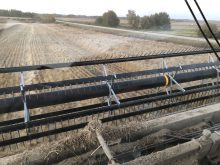It is always important to be vigilant when doing business with people and companies, but this is especially the case during difficult times.
Considering the number of agricultural companies that have suffered financial problems over the past few years, the industry is in a challenging period.
Grain buyers have taken the most notable shellacking.
Read Also

Agriculture, including the pork sector, has monsters to slay in 2026
Tariffs, trade protectionism and disruption; Uncertainty is weighing against what should be positive signals for Manitoba’s pork sector.
This isn’t surprising, considering the fickle market conditions and the drought that settled into many Prairie growing regions a few years ago.
The Canadian Grain Commission’s web page that documents grain company licence changes lists dozens of grain dealers and primary elevators that cancelled or didn’t renew their licenses since the beginning of 2023.
However, it’s the five grain buyers based on the Prairies that grabbed the headlines.
Zeghers Seed, Global Food and Ingredients, Purely Canada Foods, LSM Grain and Sunrise Foods International all had their licenses revoked by the grain commission since the middle of 2024.
In most of these cases, the companies’ bonds have been adequate to compensate eligible farmers.
However, there are farmers who were not made whole for the grain they delivered, including those who didn’t file a non-payment claim within the timeframe set by the commission — either 90 days from the date of each grain delivery or 30 days from the date a cash purchase ticket or cheque is issued.
It isn’t just grain buyers that are facing tough times.
The Western Producer started receiving calls a few weeks ago from farmers who said they never received inputs from AgraCity that were pre-purchased over the winter.
Reporter Sean Pratt made a few phone calls to the company and its representatives, and it subsequently sent a letter to its customers that said it will be unable to deliver outstanding products in a timely manner this spring due to cash flow problems.
These troubled times have extended into the agricultural equipment sector, with two long-time Yorkton, Sask., manufacturing businesses, Leon Manufacturing and Ram Industries, placed in bankruptcy in January.
Several farmers ended up going through the courts to try to recoup the funds they spent to purchase equipment from these companies.
Because the purchase prices for inputs and equipment are so large, it doesn’t take long for farmers to get into a situation where they are owed a serious amount of money when a company they’re dealing with goes bankrupt.
A quick scan of the Better Business Bureau can be very useful for farmers to decide where to do business. For instance, both AgraCity and Leon’s have complaints listed there.
Farmers commonly share their experience with companies on social media, and it might be useful to ask a few groups or forums about a specific company before signing a deal.
When it comes to selling grain, a lawyer might catch something on a contract that could make farmers decide to work with a different buyer.
At the very least, farmers must understand what their rights and obligations are at delivery and take steps to make sure they are protected.
The best price should not be the only consideration on where the deal should land, especially during difficult times.
There are many ways farmers can be vigilant when it comes to the companies they deal with — unfortunately, none are foolproof.
This article first appeared in the Western Producer, a fellow Glacier FarmMedia publication. Karen Briere, Bruce Dyck, RobinBooker, Paul Yanko and Laura Rance collaborate in the writing of Western Producer editorials.















